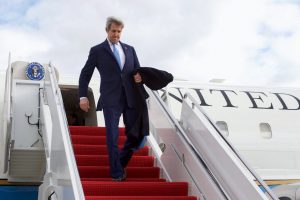U.S. climate envoy John Kerry met in Tokyo on Tuesday with Japan’s top diplomat to push efforts to fight climate change ahead of a United Nations conference in November.
Foreign Minister Motegi Toshimitsu highlighted what he said was the importance of getting other major carbon emitters, especially China, to cooperate.
“China is the world’s biggest carbon emitter and the number two economy as well, and it is extremely important that we encourage China to firmly fulfill its responsibility to match its place,” Motegi told reporters after his meeting with Kerry.
Motegi added that he hoped Japan and the United States would lead global decarbonizing efforts at the U.N. conference to be held in Glasgow in late November, known as COP26, and beyond.
The United States is the second-largest carbon emitter. Japan is fifth.
Kerry was also scheduled to meet with Prime Minister Suga Yoshihide, Environment Minister Koizumi Shinjiro, as well as Economy, Trade and Industry Minister Kajiyama Hiroshi.
Kerry arrived in Japan on Monday and will fly out on Tuesday evening to China for more climate talks — his second trip to the country during the Biden administration. During his September 1-3 China visit, Kerry is expected to meet with his Chinese counterpart, Xie Zhenhua.
Kerry has called on global leaders to work together and accelerate actions needed to curb rising temperatures to no more than 1.5 degrees Celsius over pre-industrial levels. He urged China to join the U.S. in urgently cutting carbon emissions.
Many countries have pledged to eliminate net carbon emissions by 2050. Japan has promised to strive to reduce its emissions by 46 percent from 2012 levels, up from an earlier target of 26 percent, to achieve carbon neutrality by 2050. China has also set a goal to reach carbon neutrality by 2060.
Suga has said Japan will try to push the reduction as high as 50 percent to be in line with the European Union.
In order to achieve that target, Japan’s Environment Ministry is seeking a significant budget increase to promote renewable energy and decarbonizing programs. The Trade and Industry Ministry plans to use large subsidies to promote electric vehicles and wind power generation, according to a draft budget proposal for 2022.
The Trade and Industry Ministry, in its draft basic energy plan released in July, said the share of renewables should be raised to 36-38 percent of the power supply in 2030 from the current target of 22-24 percent.

































